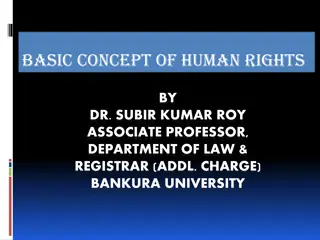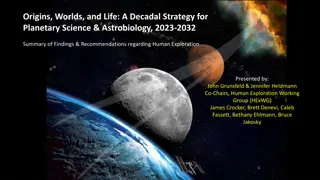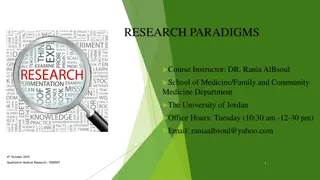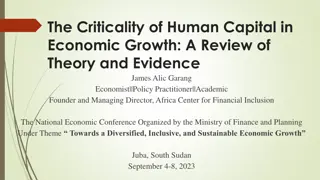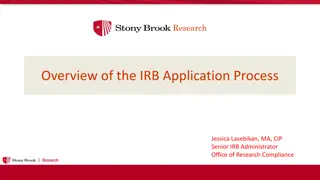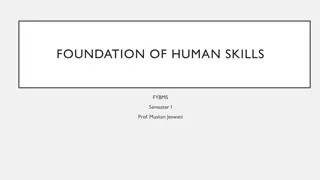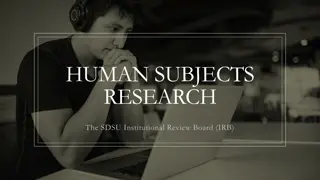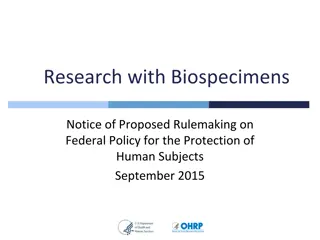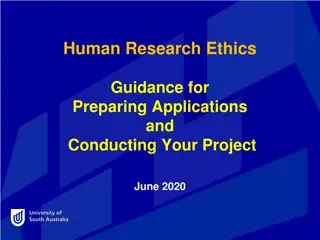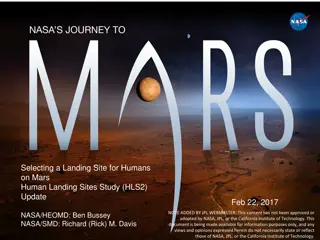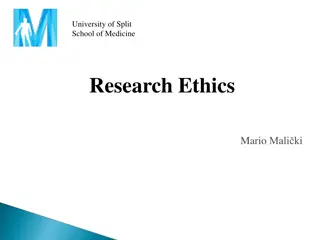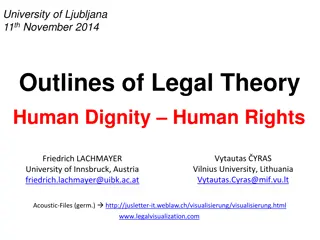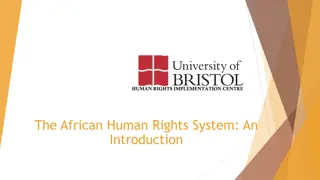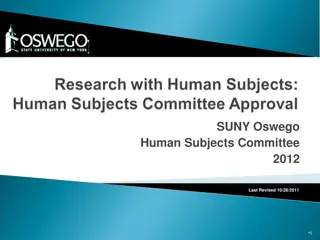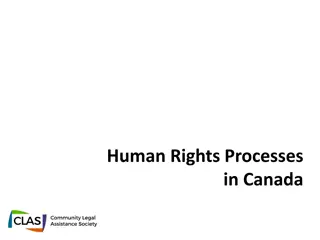Human Systems Integration in Technology Development
Human Systems Integration (HSI) is a crucial interdisciplinary process in systems engineering that integrates human factors to enhance system design, reduce costs, and optimize performance. This presentation by NASA experts delves into the benefits of HSI, the human readiness level metrics, and its
2 views • 23 slides
Approaches to the study of Human Rights
The Marxist perspective on human rights emphasizes social rights over individual rights, viewing the full realization of self within society. Marx connects bourgeois society with human rights, highlighting how exploitation under capitalism alienates individuals. In contrast, the Third World perspect
5 views • 19 slides
Overview of Human Factors and Automotive Standards YouTube Series
This YouTube series, led by Paul Green from the University of Michigan, covers human factors and automotive standards. It includes topics like introduction to standards, core human factors standards, automotive human factors standards, human-computer interaction standards, and SAE vehicle standards.
7 views • 9 slides
UCC Research Support and Strategies Overview
UCC's Research Support, Policy & Strategy function, led by David O'Connell, PhD, provides comprehensive support for research activities at the university. The office manages research funding, monitors performance, and facilitates engagement with external stakeholders. UCC's involvement in Horizon Eu
4 views • 17 slides
Evolution of Human-Environment Relationship Through History
The evolution of human-environment relationships can be traced through four key stages - from hunting and food gathering in early human history to the modern era of science, technology, and industrialization. Each phase reflects changing attitudes towards nature and resource utilization, highlightin
0 views • 10 slides
Human Rights in Queensland Government Work
The Human Rights Act of 2019 in Queensland outlines protected rights such as equality, freedom of expression, and fair trial. All public service employees must adhere to these rights, ensuring decisions and actions respect human rights. This act applies to everyone in the Queensland Government, with
3 views • 13 slides
The Basic Concept of Human Rights in Modern Jurisprudence
Human rights are natural and inalienable, essential for human life, based on universal principles. The concept of human rights is both simple and complex, requiring societal development and political will for implementation. Rooted in natural law theory, human rights have evolved from natural law to
1 views • 24 slides
Overview of Saddleback College Human Services Program 2023
Providing insight into the 12th Annual Human Services Information Session, the program overview, academic counseling, pursuit of higher education, certification processes, and the dedicated Human Services Team at Saddleback College. The session explores the significance of social and human service w
2 views • 31 slides
Exploration Strategy for Planetary Science & Astrobiology 2023-2032
The decadal strategy outlines a comprehensive plan for planetary science and astrobiology, emphasizing the integration of human exploration activities with scientific objectives. Key elements include leveraging planned human space missions for new scientific opportunities and identifying areas of pl
9 views • 10 slides
Media Ecology: Impact of Communication Technology
Media ecology is a theoretical concept analyzing the influence of media and communication technology on human culture. Neil Postman, a prominent figure in the field, delves into how communication media affect human perception, understanding, and values. This study views media as environments shaping
7 views • 23 slides
Overview of Research Problem Identification and Formulation
Understanding the importance of defining a research problem, this content delves into the selection and formulation of research problems, the definition of a research problem, reasons for defining it, methods for identifying research problems, sources of research problems, and considerations in sele
1 views • 11 slides
Research Paradigms in Qualitative Medical Research
Delve into the world of research paradigms in qualitative medical research with a focus on the key differences between objective and subjective research, the meaning of research paradigms, components of research paradigms, types of research paradigms, and how paradigms guide the selection of researc
1 views • 42 slides
The Critical Role of Human Capital in Economic Growth: A Review
Literature highlights the significance of human capital formation in driving economic growth and achieving macroeconomic objectives. Human capital accumulation enhances productivity, reduces unemployment, poverty, and inequality, underscoring the need for investments in education, health, and job tr
0 views • 25 slides
Guidelines for Selecting Research Project Topics in Environmental Health
Research is crucial for addressing environmental health issues. Choosing a good research topic is the first step towards effective research. This paper discusses the meaning, characteristics, types of research, and the research process to help in selecting appropriate research topics. Understanding
1 views • 15 slides
The IRB Application Process Overview
This comprehensive overview delves into the IRB application process, covering topics such as human research protections, IRB oversight requirements, different types of reviews, informed consent, response to IRB correspondence, common errors, and the significance of ethics in research. Key historical
1 views • 27 slides
UGA's Human Research Protection Program
The UGA Human Research Protection Program (HRPP) aims to ensure the rights and welfare of research subjects by adhering to ethical and regulatory standards. This program consists of various components such as Institutional Leadership, Human Subjects Office, IRBs, Investigators, and more, with a miss
0 views • 9 slides
Human Nature and Individual Differences in Foundation of Human Skills
Explore the foundational concepts of human behavior, individual differences, and organizational culture in the study of human skills. Delve into topics such as human nature, personality, attitudes, intelligence, and learning in Prof. Muskan Jeswani's course. Understand the significance of inter- and
0 views • 11 slides
Research Ethics at the University of Liverpool
Research Ethics at the University of Liverpool play a crucial role in ensuring the dignity, rights, safety, and well-being of human participants are respected and safeguarded. Ethical approval is mandatory for all research involving human participants, animals, their tissues, or data. Consent, priva
0 views • 14 slides
Uniqueness of Human Language and Communication Contrasted with Animal Communication
Human language possesses unique properties such as reflexivity, displacement, and arbitrariness, setting it apart from animal communication. These distinctions enable humans to communicate abstract concepts, discuss past and future events, and use arbitrary linguistic forms. The contrast between hum
1 views • 17 slides
Human Subjects Research at SDSU
Explore the process of conducting human subjects research at SDSU through lessons on recognizing research activities, determining involvement with human subjects, identifying common pitfalls in proposal submissions, finding IRB information, and submitting proposals. Gain insights on the importance o
4 views • 13 slides
Evolution of Human Rights: From Ancient Times to Modern Era
Throughout history, ideas of rights and liberty have evolved, leading to the recognition of universal human rights in the modern sense. The concept of human rights can be traced back to significant historical events such as the English Bill of Rights, the Virginia Declaration of 1776, and the French
0 views • 7 slides
Proposed Rulemaking on Biospecimen Research: Federal Policy Update
The proposed rulemaking aims to enhance the protection of human subjects in research involving biospecimens. Key changes include expanding the definition of human subjects, requiring informed consent for biospecimen research, allowing broad consent for secondary research, and creating exemptions to
0 views • 17 slides
The Link Between Democracy and Human Rights
The core of democracy lies in promoting equal human worth and self-determination. There is a strong connection between human rights, democracy, good governance, and development. Democracy allows people to participate in decision-making, ensuring their views are heard. It upholds freedom, equality, f
0 views • 15 slides
Human Research Ethics Guidance for Researchers: Application and Approval Processes
This document provides comprehensive guidance for researchers on preparing applications and conducting human research ethics projects. It covers various aspects such as recruitment processes, consent processes, risk management, data collection, and reporting. The guidelines aim to ensure high-qualit
1 views • 24 slides
Selecting Landing Sites for Humans on Mars: HLS2 Study Update
The Human Landing Sites Study (HLS2) aims to identify suitable landing sites for human exploration on Mars, focusing on Exploration Zones (EZs) that meet scientific, engineering, and human criteria. Leveraging data from the Mars Reconnaissance Orbiter (MRO), the study establishes a database of high-
0 views • 15 slides
The Significance of Human Rights in the Modern World
Human rights are fundamental rights that belong to all individuals, are inalienable, indivisible, interconnected, and should be respected without prejudice. The Universal Declaration of Human Rights, adopted in 1948 after WWII by the United Nations, is a crucial milestone document emphasizing human
1 views • 5 slides
Federal Aviation Administration Subcommittee on Human Factors Fall 2015 Review
This document discusses the review of flight deck and maintenance systems integration human factors by Kathy Abbott in September 2015. It outlines the purpose, benefits, and success factors of the BLI Portfolio Overview related to human factors in aviation operations. Furthermore, it presents core f
0 views • 10 slides
Research Ethics in Human Experimentation and History of Bioethics
Delve into the complexities of research ethics, focusing on human and animal experimentation, environmental ethics, and publication ethics. Learn about the critical evaluation of dilemmas in research, research integrity, and the moral code of academia. Understand the definition of research with huma
0 views • 41 slides
Evolution of Ethics in Human Subjects Research
Human Subjects Research (HSR) or Human Subjects Use (HSU) plays a vital role in medical research, with a historical background and strict ethical guidelines in place. From past atrocities to contemporary practices, the use of human subjects has evolved, emphasizing the importance of informed consent
0 views • 26 slides
Enhancing Transparency in Human Rights Performance Measurement
This information focuses on initiatives like the Human Rights Measurement Initiative (HRMI) that aim to provide new data for researching and advocating human rights issues globally. The HRMI project, founded in 2015, collaborates with various stakeholders and is funded by philanthropic grants. It em
1 views • 19 slides
Outlines of Legal Theory Human Dignity – Human Rights
Explore the significance of human dignity and human rights within legal theory, reflecting on their cultural, moral, and legal implications. Delve into the essence of human rights as an essential cultural achievement, contrasting the protection and denial of human images within different legal conte
0 views • 10 slides
Ensuring Compliance in Human Research Programs at Yale University
Yale University's Human Research Protection Program (HRPP) emphasizes the importance of preventing and addressing deviations in research practices. Led by experienced compliance managers, the HRPP RQA&C team at Yale focuses on conducting reviews, responding to research complaints, and developing eff
0 views • 32 slides
Research Design and Funding Priorities in Northern Ireland
Dive into the world of research at the upcoming Application and Research Design Workshop scheduled for Friday, 28th May 2021. Discover the strategic priorities driving impactful research initiatives, learn about current research projects, funding processes, and collaborations. Explore the rich histo
0 views • 37 slides
Human Rights: Module 1 Overview
This module serves as an introduction to human rights principles, instruments, and monitoring mechanisms. It covers the definition of human rights, the Universal Declaration on Human Rights, key principles, and state obligations. Human rights are universal legal guarantees that protect individuals a
0 views • 21 slides
International Focus Programme: Human Rights and Technology Advocacy
The International Focus Programme (IFP) is actively engaging in advocating human rights and technology through various initiatives and campaigns. This includes organizing online meetings, webinars, surveys, and events to raise awareness about freedom of expression online, artificial intelligence, an
1 views • 8 slides
Human Subject Research and JIT Process at COMIRB
Explore the world of Human Subject Research and Just-In-Time (JIT) process as explained by Assistant Director Cat Sutherland at COMIRB. Learn about exempt categories, secondary research, grant approvals, and the intricate JIT process. Get insights into education research, surveys, behavioral interve
0 views • 7 slides
Overview of the African Human Rights System
The African Human Rights System encompasses various key elements such as the Organisation of African Unity, African Charter on Human and Peoples' Rights, African Court on Human and Peoples' Rights, African Union, and additional human rights-related treaties and protocols. This system aims to protect
1 views • 19 slides
Guidelines and Procedures for Human Subjects Research at SUNY Oswego
Guidelines and procedures for conducting research with human subjects at SUNY Oswego are outlined by the Human Subjects Committee. The mission is to protect all subjects, especially students and vulnerable populations. Researchers must comply with regulations for the ethical conduct of studies invol
0 views • 15 slides
Human Rights Processes in Canada: Legislation and Protections Explained
Understand the human rights processes in Canada, including the two general sources of human rights, human rights legislation, federal vs. provincial/territorial laws, and the specifics of the BC Human Rights Code. Learn about direct and indirect discrimination, duty to accommodate, and the areas pro
1 views • 12 slides
Canada's Investment in Cancer Survivorship Research, 2005-2016 Highlights
The Canadian Cancer Research Alliance (CCRA) collaborates with various organizations to fund cancer research in Canada, focusing on prevention, diagnosis, treatment, and improving survivor outcomes. The CCRA is supported by the Canadian Partnership Against Cancer to implement strategies for cancer c
0 views • 25 slides






